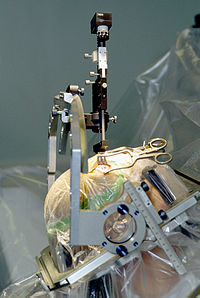
Photo from wikipedia
BackgroundPrior studies have documented an increased complication rate in diabetic patients undergoing spinal surgery. However, the impact of diabetes on the risk of postoperative complications and clinical outcome following minimally… Click to show full abstract
BackgroundPrior studies have documented an increased complication rate in diabetic patients undergoing spinal surgery. However, the impact of diabetes on the risk of postoperative complications and clinical outcome following minimally invasive spinal (MIS) decompression is not well understood.ObjectivesTo compare complication rates and outcomes of MIS decompression in diabetic patients with a cohort of non-diabetic patients undergoing similar procedures.MethodsMedical records of 48 patients with diabetes and 151 control patients that underwent minimally invasive lumbar decompression between April 2009 and July 2014 at our institute were reviewed and compared. Past medical history, the American Society of Anesthesiologists score, perioperative mortality, complication and revision surgeries rates were analyzed. Patient outcomes included: the visual analog scale and the EQ-5D scores.ResultsThe mean age was 68.58 ± 11 years in the diabetic group and 51.7 ± 17.7 years in the control group. No major postoperative complications were recorded in either group. Both groups were statistically equivalent in their postoperative length of stay, minor complications and revision rates. Both groups showed significant improvement in their outcome scores following surgery.ConclusionsOur results indicate that minimally invasive decompressive surgery is a safe and effective treatment for diabetic patients and does not pose an increased risk of complications. Future prospective studies are necessary to validate the specific advantages of the minimally invasive techniques in the diabetic population.Graphical abstractThese slides can be retrieved under Electronic Supplementary Material.
Journal Title: European Spine Journal
Year Published: 2018
Link to full text (if available)
Share on Social Media: Sign Up to like & get
recommendations!